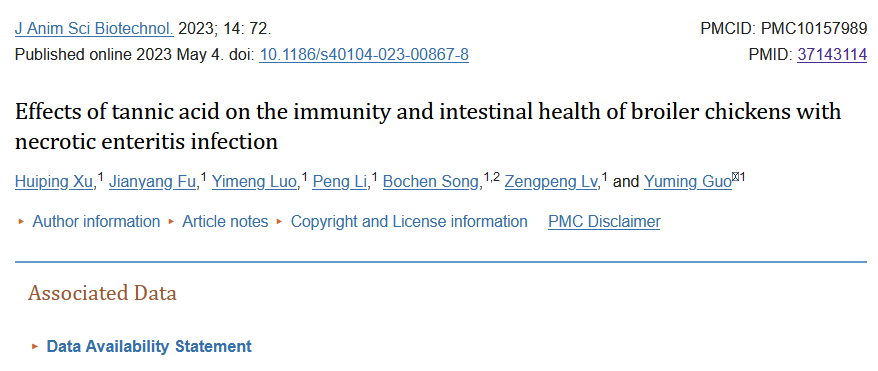Effects of tannic acid on the immunity and intestinal health of broiler chickens with necrotic enteritis infection
IF: 7

文獻(xiàn)引用產(chǎn)品:雞分泌型免疫球蛋白A(SIgA)ELISA試劑盒
品牌:遠(yuǎn)慕生物
貨號:YM-A3724
Abstract
Background In broiler chickens, necrotic enteritis (NE) infection can reduce production performance. Tannic acid has shown great potential as a treatment of NE in broilers. However, the appropriate dosage of tannic acid in NE of broilers and the improvement effect on intestinal health are not very clear. In this study, we aimed to investigate the effects of different doses of tannic acid on the production performance, immunity, and intestinal health of broilers by constructing an NE model with C. perfringens infection and determining the appropriate dosage of tannic acid with regard to NE.
Results Challenged birds showed significant reduction in body weight, villus height, and the ratio of villus height to crypt depth (P < 0.05) and increase in the feed consumption gain ratio, intestinal lesion score, and crypt depth(P < 0.05). The infection significantly reduced the relative Bacteroidota and Ligilactobacillus abundance (P < 0.05) and increased the ratio of Firmicutes/Bacteroidota and cecal content of C. perfringens (P < 0.05). Challenged birds fed diets supplemented with tannic acid showed significantly increased mRNA expression of nutrient transport carriers and intestinal barrier genes and growth performance and reduced serum zonulin and endotoxin levels (P < 0.05). Addi-tion of tannic acid to the diet inhibited the inflammatory response by reducing the number of coccidia oocysts in feces and the content of C. perfringens in the cecum. Specifically, tannic acid reduced the serum levels of C reactive protein, myeloperoxidase, and specific IgY and ileal mucosal secretory immunoglobulin A levels in the ileal mucosa compared with those in the NE-infected birds. NE-infected birds fed diets supplemented with tannic acid also showed significantly increased relative Anaerocolumna, Thermoanaerobacterium, and Thermosinus abundance (P < 0.05); their microbial composition and functional predictions were similar to those of the NC group.
Conclusions Tannic acid in the diet alleviated NE by enhancing the intestinal barrier and absorption function. The recommended dietary tannic acid additive level is 500–750 mg/kg. Our study findings would be useful in reducing related economic losses in the broiler industry.
Keywords Broiler chicken, Immunity, Intestinal health, Necrotic enteritis, Tannic acid
